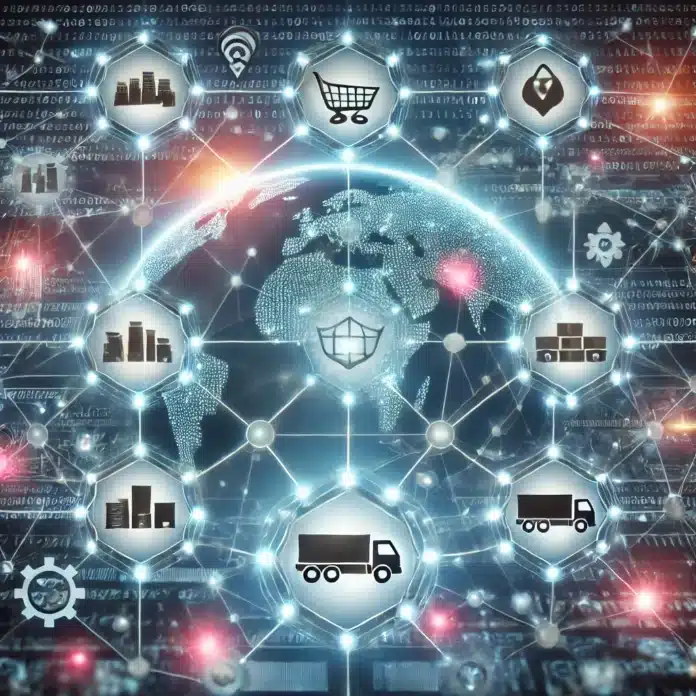In today’s globalized economy, supply chains are more complex than ever. Companies are sourcing materials from various parts of the world, involving numerous suppliers, logistics providers, and intermediaries. This complexity has made supply chains vulnerable to fraud, inefficiency, and lack of transparency. However, blockchain technology is emerging as a powerful solution to these challenges, offering unprecedented security, transparency, and efficiency in supply chain management.
In this article, we’ll explore how blockchain is transforming supply chains and why businesses are increasingly adopting this technology to enhance security and trust.
What is Blockchain?
Blockchain is a distributed ledger technology that allows information to be recorded and shared across a network in a secure, transparent, and tamper-resistant way. Each transaction is recorded in a “block,” and these blocks are linked together in a chronological “chain.” Once data is added to the blockchain, it cannot be altered or deleted, making it ideal for ensuring data integrity and traceability.
Key Challenges in Traditional Supply Chains
Before diving into how blockchain improves supply chains, it’s essential to understand the problems that plague traditional supply chain systems:
1. Lack of Transparency: With so many parties involved, it’s often difficult to track the journey of products from origin to destination, leading to opacity in processes and transactions.
2. Counterfeiting and Fraud: In industries like pharmaceuticals, food, and luxury goods, counterfeiting is a significant concern. Fraudulent products can enter the supply chain, leading to revenue loss and damage to brand reputation.
3. Inefficiency and Delays: Traditional supply chains rely on a series of intermediaries and paper-based processes, leading to delays, higher costs, and inefficiencies.
4. Limited Visibility: Companies often lack real-time insights into the location and status of goods, making it difficult to manage risks and disruptions.
Blockchain offers solutions to many of these challenges by creating a secure, transparent, and efficient system for tracking goods and verifying transactions throughout the supply chain.
How Blockchain Enhances Supply Chain Security
Blockchain technology provides several features that make it ideal for securing supply chains:
1. Transparency and Traceability
Blockchain allows for the real-time tracking of goods as they move through the supply chain. Every transaction, from the moment raw materials are sourced to the final delivery of the product, is recorded on the blockchain. This creates a digital audit trail that can be accessed by all authorized participants.
For example, in the food industry, blockchain can track the journey of produce from farm to table, ensuring that food safety standards are met at every stage. If contamination occurs, blockchain allows companies to trace the source of the issue quickly, minimizing the risk of widespread recalls.
2. Enhanced Security and Data Integrity
Blockchain’s decentralized and cryptographic nature makes it nearly impossible for data to be altered or tampered with once it’s recorded. Each transaction is encrypted and added to the blockchain in a way that links it to the previous transaction, creating a secure chain of data.
This feature is especially useful for industries that rely on regulatory compliance, such as pharmaceuticals. Blockchain ensures that sensitive data related to drug production, handling, and distribution is accurate and immutable, reducing the risk of counterfeit drugs entering the market.
3. Eliminating Fraud and Counterfeiting
Counterfeiting is a major concern for companies across various sectors. Blockchain technology can be used to verify the authenticity of goods by recording every step of their journey on an immutable ledger. This helps in identifying fraudulent products before they reach consumers.
In the luxury goods market, for instance, blockchain can be used to track the origin of items like designer handbags or watches, ensuring that consumers receive genuine products and protecting the brand’s reputation.
4. Smart Contracts for Automation
Blockchain’s smart contract functionality adds another layer of efficiency and security to supply chain management. Smart contracts are self-executing contracts with the terms of the agreement directly written into code. These contracts automatically trigger actions when predefined conditions are met.
For example, when a shipment reaches its destination, a smart contract can automatically release payment to the supplier, reducing the need for manual processes and minimizing the risk of payment delays or disputes.
5. Real-time Visibility and Monitoring
Blockchain provides real-time visibility into the location and status of goods as they move through the supply chain. With IoT (Internet of Things) devices and sensors, companies can track environmental conditions like temperature or humidity, ensuring that products such as perishable goods or vaccines are transported under the right conditions.
This visibility allows businesses to anticipate and manage risks, such as delays or spoilage, and optimize their supply chain operations for maximum efficiency.
Industries Leveraging Blockchain for Supply Chain Security
1. Food and Agriculture
The food industry faces significant challenges in ensuring the safety and traceability of products. Blockchain helps food companies trace the origin and journey of products from farm to table. Walmart, for example, has implemented a blockchain-based system to track leafy greens and other produce, allowing the company to trace the source of contamination in seconds instead of days.
2. Pharmaceuticals
Pharmaceutical supply chains are often vulnerable to counterfeit drugs and improper handling. Blockchain can secure the distribution of medicines, ensuring that only authorized distributors handle products and that drugs are stored in proper conditions during transport. IBM’s blockchain platform, for instance, is helping the pharmaceutical industry ensure drug authenticity and compliance with regulatory standards.
3. Luxury Goods
Counterfeit luxury goods are a growing problem, with billions of dollars lost annually to fake products. Blockchain enables brands to authenticate products by providing a transparent and tamper-proof record of a product’s journey from creation to sale. LVMH, the luxury goods conglomerate, has developed a blockchain platform to track the origin and authenticity of its products.
4. Automotive
In the automotive industry, blockchain is used to track the provenance of vehicle parts, ensuring that only genuine, certified components are used in production. This can prevent counterfeit parts from entering the market and ensure that vehicles are built to the highest safety and quality standards.
Challenges to Blockchain Adoption in Supply Chains
While blockchain offers numerous advantages, its adoption is not without challenges:
-Scalability: Blockchain networks can become slow and expensive as the number of participants and transactions grows, limiting its use in large-scale supply chains.
-Integration with Legacy Systems: Many businesses still rely on legacy systems that are not easily compatible with blockchain technology, making implementation more complex.
-Regulatory Hurdle: As blockchain technology is still relatively new, regulations surrounding its use in supply chains are still evolving, and companies may face legal uncertainties.
Conclusion
Blockchain technology is poised to revolutionize supply chain management by enhancing security, transparency, and efficiency. By providing an immutable, decentralized ledger, blockchain enables businesses to track goods in real-time, eliminate fraud, and ensure the integrity of products as they move through the supply chain.
As companies continue to explore and adopt blockchain, it will play an increasingly vital role in securing global supply chains, driving operational efficiency, and building trust with consumers. While challenges remain, the potential benefits of blockchain in supply chain management are vast, and businesses that embrace this technology will be better positioned to thrive in an increasingly complex and interconnected world.















